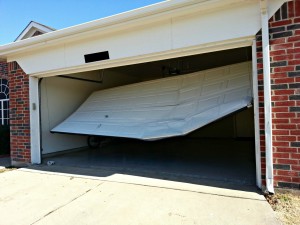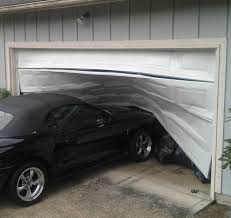Alas, even the best-made garage doors may eventually need replacement. Sometimes you need a new door because a car damages the old one. More often, wear and tear are the culprits. One nice benefit of obtaining a new garage door is access to the latest safety and security features.
You Just Might Need a New Garage Door If…
1. Shaking and Quaking: Has your door lost its smooth operation? Old age may cause your door to shake, rattle and roll, and to make a lot of noise in the process. The cause may be broken parts that result in uneven movement.
2. Broken Parts: Speaking of broken parts, has your door stopped operating altogether? While it's easy to replace a broken part, if there is substantial damage, it's cheaper and safer to get a new door. Inspect the door carefully, and if the bottom section is broken, or if your woodendoor is exhibiting splinters and broken edges, it's a safe bet that a replacement is necessary.
3. Shocking Damage: Do you receive an occasional electric shock when you touch a metal part? Are there loose, frayed or broken electric wires? Broken cords and wires are dangerous, and they can cause permanent damage to your door.
4. Doing the Jerk: Does your door dance the jerk whenever you open or close it? Inconsistent movement is a warning that the door may be facing total collapse. The problem may be with door parts and/or with the opener. Jerky movement can cause personal injury and damage to your car.
5. Door Dangle: A closed garage door should sit evenly on the ground, even if the ground is sloped. A gap caused by a mechanical failure is an open invitation to insects, snakes, rats and other pests to come visit your garage. Wind and rain can penetrate the gap, and heat or air conditioning can escape.
6. Insufficient Insulation: Utility bills are a lot higher than they used to be. If you have a heated/cooled garage, lack of insulation, or damage to the insulation, will jack up your utility bills. Replace your old door with a modern, insulated one and watch your utility bills drop.
7. Doesn't Sound Good: A door in good repair should be relatively quiet. Overhead doors will always make some noise, but if you hear grinding, squeaking or squealing sounds, something bad is going on. At the very least, have the door inspected to identify the root of the problem. The fix might be some simple lubrication, but it can also indicate a damaged or broken spring, which could be dangerous. Remember, never try to repair a garage door spring yourself -- you could be severely injured if the spring snaps.
8. Safety First: Even if your old door is operating satisfactorily, it might be missing important safety features that put your family and car at risk. Modern doors should always have sensor technology that reverses a closing door if an object lies in its path. Infrared door sensors at the base of the door opening prevent the door from closing if the beam is interrupted. The leading edge of the closing door should have sensors that immediately reverse the door if it comes into contact with an obstacle. You might be able to retrofit these features onto your door, but it might be simpler to get a modern door.
9. Insecure Doors: Old doors may be easy prey to burglars, because the door may lack structural strength. Old, rusty parts may make it easy for someone to break in. Old style garage openers don't prevent code breakers from stealing your remote control codes. If your door doesn't seem secure, replace it.
10. DIY, although many of the issues above can be addressed as DIY projects, most people are not equipped to repair or replace a garage door on their own, call a qualified professional.












